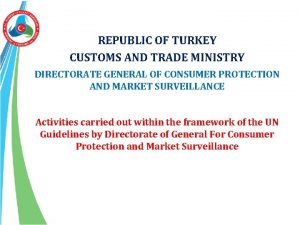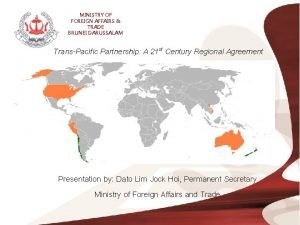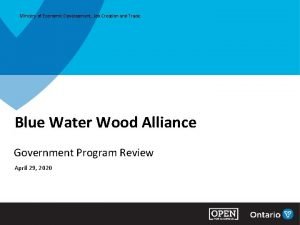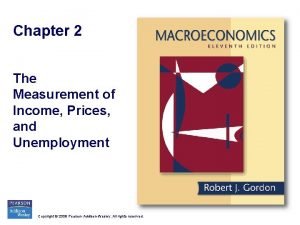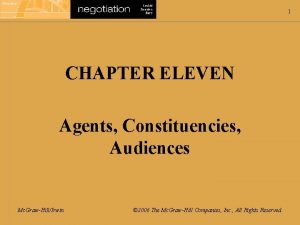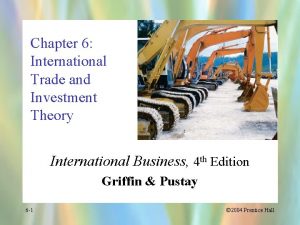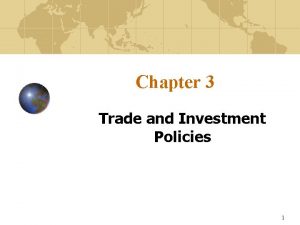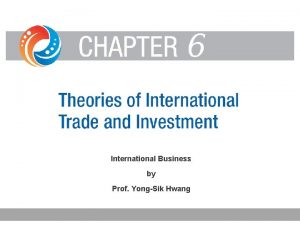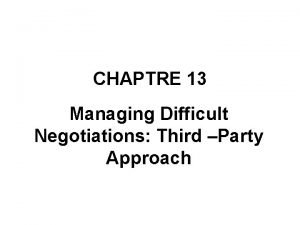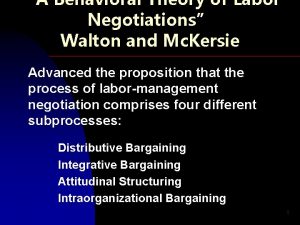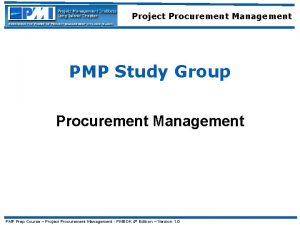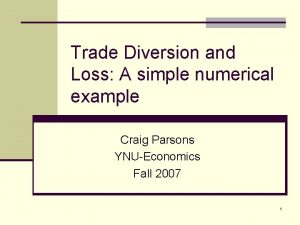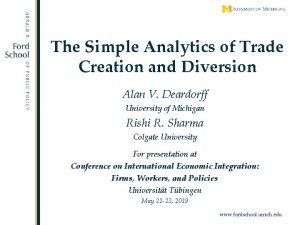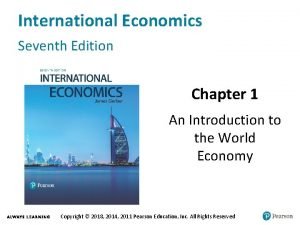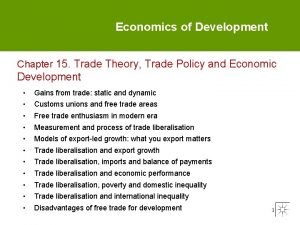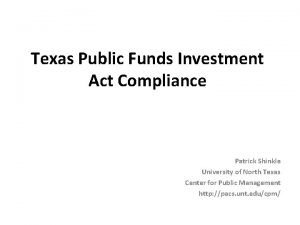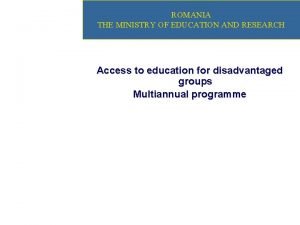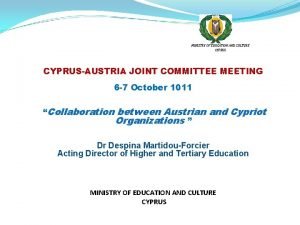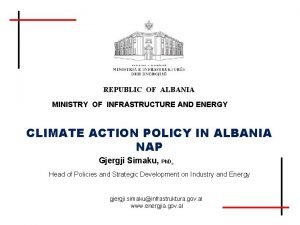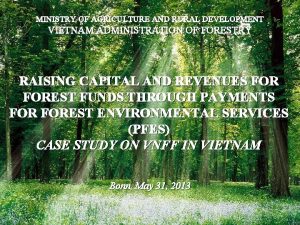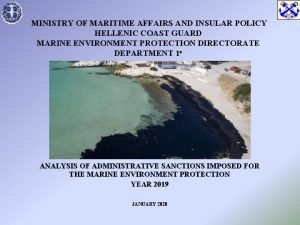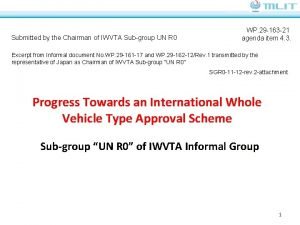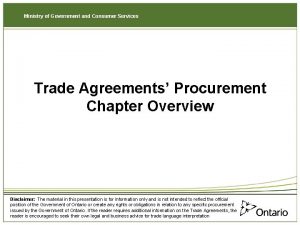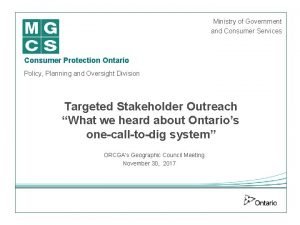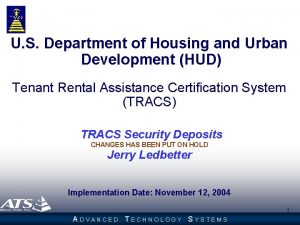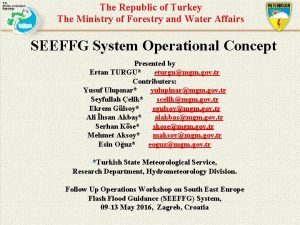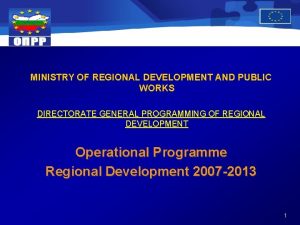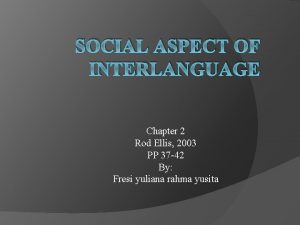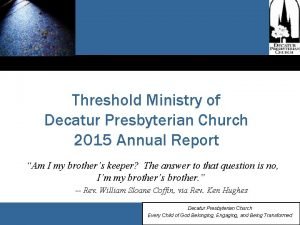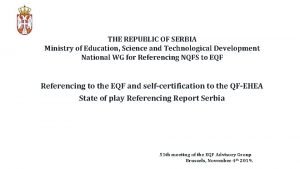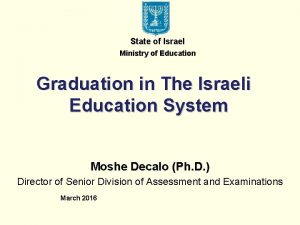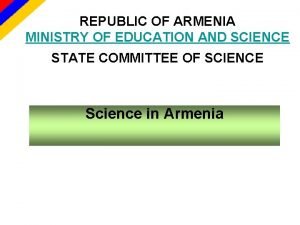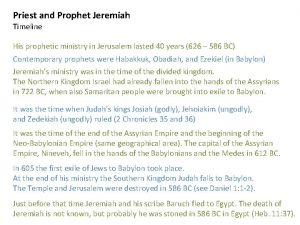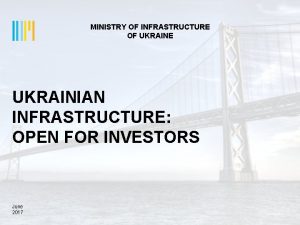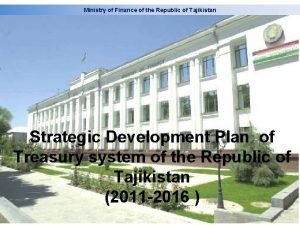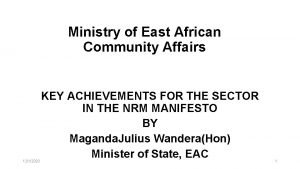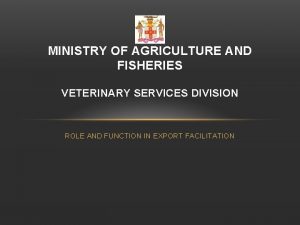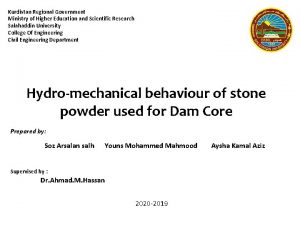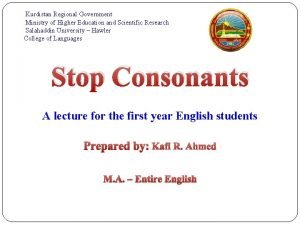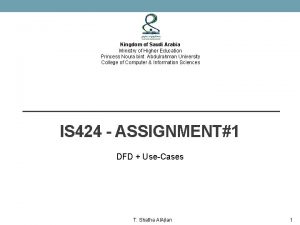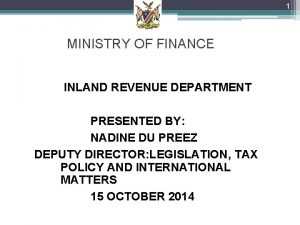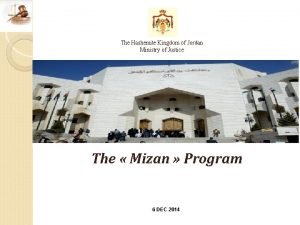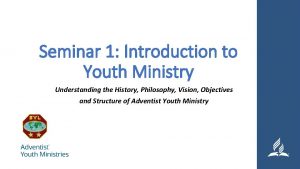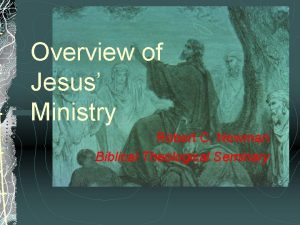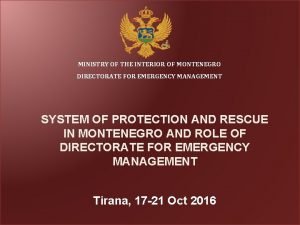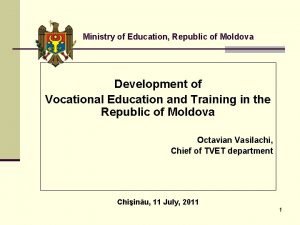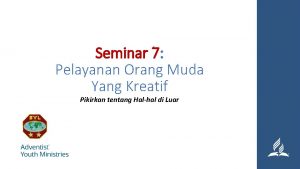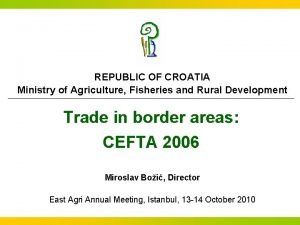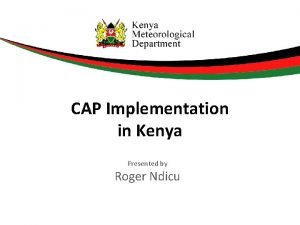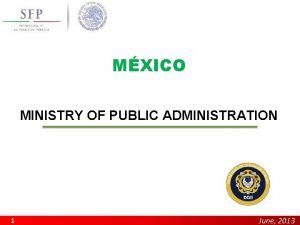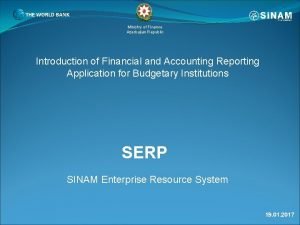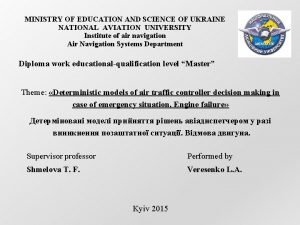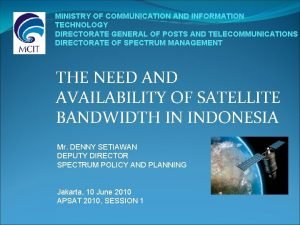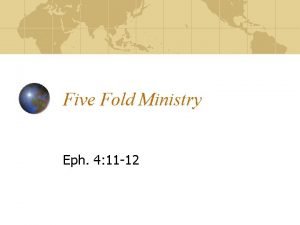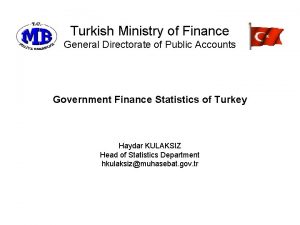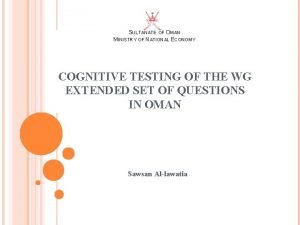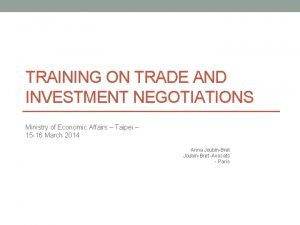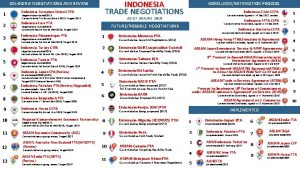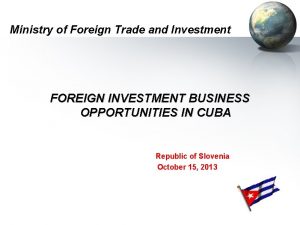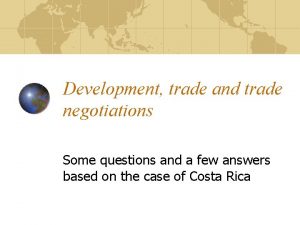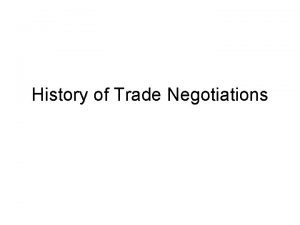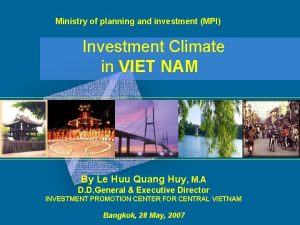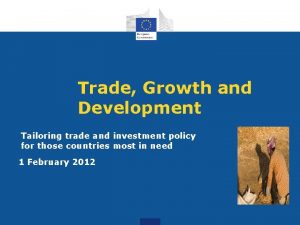TRAINING ON TRADE AND INVESTMENT NEGOTIATIONS Ministry of



























![28 TECMED v. Mexico, ICSID AF, Award, May 29, 2003, ¶ 154 excerpts [I]n 28 TECMED v. Mexico, ICSID AF, Award, May 29, 2003, ¶ 154 excerpts [I]n](https://slidetodoc.com/presentation_image_h/c40a773ca6ef664db14910cdb4c992db/image-28.jpg)





































![66 TECMED v. Mexico, ICSID AF, Award, May 29, 2003, ¶ 154 excerpts [I]n 66 TECMED v. Mexico, ICSID AF, Award, May 29, 2003, ¶ 154 excerpts [I]n](https://slidetodoc.com/presentation_image_h/c40a773ca6ef664db14910cdb4c992db/image-66.jpg)





















































































- Slides: 151

TRAINING ON TRADE AND INVESTMENT NEGOTIATIONS Ministry of Economic Affairs – Taipei – 15 and 16 March 2014 Anna Joubin-Bret -Avocats - Paris

Course curriculum • Module 1 – Trends and developments in FDI flows • Module 2 – The international framework for trade and • • • investment Module 3 – Trends in International investment, investment agreements and international dispute settlement Module 4 – Negotiation IIAs : Scope and definitions Module 5 – Negotiating IIAs: Treatment of investors and their investment Module 6 - Negotiating IIAs: Substantive protection provisions Module 7 - Investor-State dispute settlement (ISDS) in recent IIAs Module 8 - New disciplines in IIAs: including new disciplines and rebalancing IIAs. Is there a trend?

Module 6 – Protection • Protection against expropriation • Fair and equitable treatment • Full protection and security • Free transfers of funds

4 EXPROPRIATION AND COMPENSATION

5 What does expropriation mean? • Direct: Transfer of title or outright seizure • Indirect: Total or substantial deprivation of the substantial rights associated to an investment, without actual formal transfer or seizure, having equivalent effects to a direct expropriation • Regulatory taking: does it require a separate category? Advisable. • Classic formulation in an IIA: Neither Contracting Party may expropriate or nationalize an investment either directly or indirectly through measures tantamount to expropriation or nationalization (“expropriation”), except. . .

6 Expropriation under customary international law • It is lawful to expropriate any asset or industry. Sovereign right. • But it is unlawful to do it arbitrarily • 4 requirements: 1. For a public purpose, 2. On a non discriminatory basis, 3. In accordance with due process of law, and 4. Against payment of compensation (prompt, adequate and effective)

7 Expropriation Possible standards of compensation: • The Hull formula • Appropriate compensation • Different valuation methods: book-value method, discounted cash-flow method, … Expropriation and Regulatory Takings: Necessary clarification of the obligation • General exception: public health and safety. • The right to regulate for public purpose.

8 Protection against expropriation Finland Model BIT 1. Investments by investors of a Contracting Party in the territory of the other Contracting Party shall not be expropriated, nationalised or subjected to any other measures, direct or indirect, having an effect equivalent to expropriation or nationalisation (hereinafter referred to as "expropriation"), except for a purpose which is in the public interest, on a non-discriminatory basis, in accordance with due process of law, and against prompt, adequate and effective compensation. 2. Such compensation shall amount to the value of the expropriated investment at the time immediately before the expropriation or before the impending expropriation became public knowledge, whichever is the earlier. The value shall be determined in accordance with generally accepted principles of valuation, taking into account, inter alia, the capital invested, replacement value, appreciation, current returns, the projected flow of future returns, goodwill and other relevant factors. 3. Compensation shall be fully realisable and shall be paid without any restriction or delay. It shall include interest at a commercial rate established on a market basis for the currency of payment from the date of dispossession of the expropriated property until the date of actual payment.

9 Protection against expropriation The US approach (Model BIT 2004) 1. Neither Party may expropriate or nationalize a covered investment either directly or indirectly through measures equivalent to expropriation or nationalization (“expropriation”), except: (a) for a public purpose; (b) in a non-discriminatory manner; (c) on payment of prompt, adequate, and effective compensation; and (d) in accordance with due process of law and Article 5 [Minimum Standard of Treatment](1) through (3). 2. The compensation referred to in paragraph 1(c) shall: (a) be paid without delay; (b) be equivalent to the fair market value of the expropriated investment immediately before the expropriation took place (“the date of expropriation”); (c) not reflect any change in value occurring because the intended expropriation had become known earlier; and (d) be fully realizable and freely transferable. 3. If the fair market value is denominated in a freely usable currency, the compensation referred to in paragraph 1(c) shall be no less than the fair market value on the date of expropriation, plus interest at a commercially reasonable rate for that currency, accrued from the date of expropriation until the date of payment. 4. If the fair market value is denominated in a currency that is not freely usable, the compensation referred to in paragraph 1(c) – converted into the currency of payment at the market rate of exchange prevailing on the date of payment – shall be no less than: (…)

10 What rights can be expropriated? • Property rights • Contractual Rights? • Intangibles that are not property rights? (e. g. “goodwill” or “market share”) • Economic expectations, loss of profit?

11 Indirect Expropriation “A deprivation or taking of property may occur under international law through interference by a state in the use of that property or with the enjoyment of its benefits, even where legal title to the property is not affected. ” TIPPETTS “… it is recognized in international law that measures taken by a State can interfere with property rights to such an extent that these rights are rendered so useless that they must be deemed to have been expropriated, even though the State does not purport to have expropriated them and the legal title to the property formally remains with the original owner. ” STARRET HOUSING

12 Indirect Expropriation • There are no specific rules to determine whether a measure constitutes an indirect expropriation • Requires a case by case analysis • However, some basic principles have to be examined

13 Indirect Expropriation Factor 1: Determining the economic impact of the measure • Deprivation shall be total or at least substantial • A mere interference or a partial negative effect does not constitute an indirect expropriation • Duration of the measure • Rejecting explicitly the "sole effects"doctrine

14 SD Myers v. Canada “In this case, the Interim Order and the Final Order were designed to, and did, curb SDM’s initiative, but only for a time. Canada realized no benefit from the measure. The evidence does not support a transfer of property or benefit directly to others. An opportunity was delayed. The Tribunal concludes that this is not an expropriation case” Feldman v. Mexico “. . . the regulatory action has not deprived the Claimant of control of his company, . . . interfered directly in the internal operations. . . or displaced the Claimant as the controlling shareholder”

15 Pope & Talbot v. Canada “…the test is whether that interference is sufficiently restrictive to support a conclusion that the property has been “taken” from the owner…mere interference is not expropriation; rather, a significant degree of deprivation of fundamental rights of ownership is required” CME v. Czech Republic “…the Media Council’s actions and omissions…caused the destruction of the [joint-venture’s] operations, leaving the [joint venture] as a company with assets, but without business”.

16 Indirect Expropriation Factor 2: Interference with investor's expectations • Legitimate expectations need not to be based on specific and explicit undertakings or representations of the host State Azurix v. Argentina • Legitimate expectations require “specific commitments given by the regulating government to then putative foreign investor Methanex v. USA

17 Indirect Expropriation Factor 3: Analysis of the nature, the purpose and character of the measure • Do the “purpose” and “nature” of the measure matter? • NOT necessarily • Finally, the “public purpose” is one of 4 requirements

18 Phelps Dodge (Iran-USA) “The Tribunal fully understands the reasons why the respondent felt compelled to protect its interests through this transfer of management, and the Tribunal understands the financial, economic and social concerns that inspired the law pursuant to which it acted, but those reasons and concerns cannot relieve the Respondent of the obligation to compensate Phelps Dodge for its loss” Santa Elena v. Costa Rica “While an expropriation or taking for environmental reasons may be classified as a taking for a public purpose, and thus be legitimate, the fact that the property was taken for this reason does not affect either the nature or the measure of the compensation to be paid for the taking” “Expropriatory environmental measures – no matter how laudable and beneficial to society as a whole – are, in this respect, similar to any other expropriatory measures that a state may take in order to implement its policies: where property is expropriated, even for environmental purposes, whether domestic or international, the state’s obligation to pay compensation remains”

19 Regulatory Taking Asserting the State's right to regulate in the public interest However, the “purpose” and “nature” are part of the relevant analysis in order to establish a valid regulatory act not subject to compensation (“police power exception”), an issue widely accepted under customary international law “…state measures, prima facie a lawful exercise of powers of governments, may affect foreign interests considerably without amounting to expropriation” Ian Brownlie, Principles of Public International Law

20 Tecmed v. Mexico “The principle that the State’s exercise of its sovereign power within the framework of its police power may cause economic damage to those subject to its powers as administrator without entitling them to any compensation whatsoever is undisputable” Feldman v. Mexico “. . . not all government regulatory activity that makes it difficult or impossible for an investor to carry out a particular business, change in the law or change in the application of existing laws that makes it uneconomical to continue a particular business, is an expropriation. . ” Methanex v. USA “As a matter of general international law, a non-discriminatory regulation for a public purpose, which is enacted in accordance with due process and, which affects, inter alias, a foreign investor or investment is not deemed expropriatory and compensable…”

21 Indirect Expropriation USA BIT Model 2004, Annex B The Parties confirm their shared understanding that: 1. Article [Expropriation and Compensation] is intended to reflect customary international law concerning the obligation of States with respect to expropriation. 2. An action or a series of actions by a Party cannot constitute an expropriation unless it interferes with a tangible or intangible property right or property interest in an investment. 3. direct expropriation, where an investment is nationalized or otherwise directly expropriated through formal transfer of title or outright seizure. 4. indirect expropriation, where an action or series of actions by a Party has an effect equivalent to direct expropriation without formal transfer of title or outright seizure.

22 Indirect Expropriation USA BIT Model 2004, Annex B (Cont. ) 4. (a) The determination of whether an action or series of actions by a Party, in a specific fact situation, constitutes an indirect expropriation, requires a case-by-case, factbased inquiry that considers, among other factors: (i) action or series of actions by a Party has an adverse effect on the economic value of an investment, standing alone, does not establish that an indirect expropriation has occurred; (ii) the extent to which the government action interferes with distinct, reasonable investment-backed expectations; and (iii) the character of the government action. (b) Except in rare circumstances, non-discriminatory regulatory actions by a Party that are designed and applied to protect legitimate public welfare objectives, such as public health, safety, and the environment, do not constitute indirect expropriations.

Best practice for Taiwan • Conditions for an expropriation to be lawful: • Public purpose • Non discrimination • Due process of law • Against compensation • Prompt, adequate and effective compensation • Explanation of direct expropriation • Explanation of indirect expropriation • Clarification that regulatory takings do not constitute an expropriation.

24 FAIR AND EQUITABLE TREATMENT

25 FET and the MST • Fair and Equitable Treatment • Different formulations • No FET • FET but no source • FET international law • FET CIL • FET and relative standards • Recent interpretations • What can countries do? • Minimum standard of treatment • Evolution in the formulation • NAFTA 1105 • Recent treaties: US-Peru, Japan-Mexico, Chile, Canada • NAFTA decisions • FTC interpretation • Post-FTC awards • Some concerns ?

26 FET in ASIA : NAFTA contagion • No reference to FET or to the MST: • Australia – Singapore FTA of 2003 • New-Zealand-Singapore FTA of 2001 • New-Zealand – Thailand CEP of 2005 • FET with no reference to a source: International law • India-Indonesia BIT (article 3 -2) « Investment of each Contracting Party shall at all times be accorded fair and equitable treatment in the territory of the other Contracting Party » .

27 FET part of MST and governed by CIL • NAFTA 1105 (1): Each Party shall accord to investments of investors of another Party treatment in accordance with international law, including fair and equitable treatment and full protection and security. • FTA between US and Peru • Japan IIAs with Mexico and the Philippines: « Note: This article prescribes the customary international law minimum standard of treatment of aliens as the minimum standard of treatment to be afforded to investments of investors of the other Party. The concepts of « fair and equitable treatment » and « full protection and security » do not require treatment in addition or beyond that which is required by the customary international law minimum standard of treatment of aliens […] » .
![28 TECMED v Mexico ICSID AF Award May 29 2003 154 excerpts In 28 TECMED v. Mexico, ICSID AF, Award, May 29, 2003, ¶ 154 excerpts [I]n](https://slidetodoc.com/presentation_image_h/c40a773ca6ef664db14910cdb4c992db/image-28.jpg)
28 TECMED v. Mexico, ICSID AF, Award, May 29, 2003, ¶ 154 excerpts [I]n light of the good faith principle established by international law, [the provision] requires the Contracting Parties to provide to international investments treatment that does not affect the basic expectations that were taken into account by the foreign investor to make the investment. The foreign investor expects the host State to act in a consistent manner, free from ambiguity and totally transparently in its relations with the foreign investor, so that it may know beforehand any and all rules and regulations that will govern its investments, as well as the goals of the relevant policies and administrative practices or directives, to be able to plan its investment and comply with such regulations. .

29 TECMED v. Mexico, ICSID AF, Award, May 29, 2003, ¶ 154 excerpts “The foreign investor also expects the host State to act consistently, i. e. without arbitrarily revoking any preexisting decisions or permits issued by the State that were relied upon by the investor to assume its commitments as well as to plan and launch its commercial and business activities. . The investor also expects the State to use the legal instruments that govern the actions of the investor or the investment in conformity with the function usually assigned to such instruments, and not to deprive the investor of its investment without the required compensation. [. . ]”

30 Saluka v. Czech Republic, UNCITRAL, Partial Award, March 17, 2006 Dutch-Czech Republic BIT, art. 3(1) “Each Contracting Party shall ensure fair and equitable treatment to the investments of investors of the other Contracting Party and shall not impair, by unreasonable or discriminatory measures, the operation, management, maintenance, use, enjoyment or disposal thereof by those investors. ” ● No reference to international law

31 Saluka v. Czech Republic, UNCITRAL, Partial Award, March 17, 2006, pp. 60 -61 ● General standards cannot be reduced to a precise statement of rules ● Not a decision ex aequo et bono ● Not an open-ended mandate to secondguess government decision-making ● Specification through judicial practice

32 Content of FET – recent cases Obligation by the host State to maintain a stable and predictable legal and business framework in line with the investor’s legitimate expectations (Tecmed) PSEG v. Turkey (2007): changes in both the legislative environment as well as in attitudes and policies of the administration are contrary to the need to ensure a stable and predictable business environment for investors to operate in, as required…. . by the Treaty. Enron v. Argentina (2007): violation of FET as « the stable legal framework that induced the investment is no longer in place. . »

33 Content of FET – recent cases • MCI Power Group v. Ecuador (2007): the investor’s expectations must be paired with a legitimate objective that « does not depend solely on the inetne of the parties, bu on certainty about the contents of the enforceable obligations » . • However, in 2008 in Duke Energy v. Ecuador, the tribunal acknowledges that the investor’s expectations about the stability of the legal and business environment are important but « to be protected, they must be legitimate and reasonable at the time when the investor makes the investment » . No violation.

34 Content of FET – recent cases • Factors to be evaluated to establish legitimate expectations: • Continental Casualty Co v. Argentina: (i) the specificity of the undertaking allegedly relied upon; (ii) general legislative statements engender reduced expectations, especially with competent major international investors in a context where the political risk is high. Their enactment is by nature subject to subsequent modification, and possibly to withdrawal and cancellation, within the limits of respect of fundamental human rights and ius cogens; (iii) unilateral modification of contractual undertakings by governments, notably when issued in conformity with a legislative framework and aimed at obtaining financial resources from investors deserve more scrutiny, in the light of the context, reasons, effects, since they generate as a rule legal rights and therefore expectations of compliance; (iv) centrality to the protected investment and impact of the changes on the operation of the foreign owned business in general including its profitability is also relevant.

35 Content of FET – recent cases • Tribunals try to give content to the State’s obligation to grant FET: • Rumeli Telekom A/S and Telsim Telekomikasyon Hitzmetleri AS vs. Kazakhstan: (a) the state must act in a transparent manner; (b) the state is obliged to act in good faith; (c) the state’s conduct cannot be arbitrary, grossly unfair, unjust, idiosyncratic, discriminatory, or lacking in due process; (d) the state must respect procedural propriety and due process. It also added that “the case law confirms that to comply with the standard, the State must respect the investor’s reasonable and legitimate expectations”.

FET invoked in all 13 decisions on merits rendered in one year • FET rejected in: • LESI v. Algeria • Jan de Nul v. Egypt • Plama Consortium v. Bulgaria • Helnan International Hotels vs. Egypt • Metalpar vs. Argentina • FET accepted in: • National Grid v. 36 Argentina • Continental Casualty v. Argentina • Duke Energy v. Ecuador • Rumeli Telekom v. Kazakhstan • Biwater Gauff v. Tanzania • Pey Casado v. Chile • Desert Line Projects v. Yemen.

37 NAFTA Decisions • Metalclad Corp. v. United Mexican States, ICSID Case No. ARB (AF)/97/1 (Award) (Aug. 30, 2000) • S. D. Myers v. Canada (Partial Award) (Nov. 13, 2000) • Pope & Talbot, Inc. v. Canada (Award) (Apr. 10, 2001) • United Mexican States v. Metalclad Corp. , Supreme Court of British Columbia, 2001 BSCS 664 (May 2, 2001)

38 NAFTA Free Trade Commission • The trade ministers of the three NAFTA countries • Article 2001(2): The FTC shall “resolve disputes that may arise regarding [the Agreement’s] interpretation or application. ” • Article 1131(2): “An interpretation by the Commission of a provision of this Agreement shall be binding on a Tribunal established under [Section B of Chapter Eleven]. ”

39 FTC Interpretation July 2001 B. Minimum Standard of Treatment in Accordance with International Law 1. Article 1105 prescribes the customary international law minimum standard of treatment of aliens as the minimum standard of treatment to be afforded to investments of investors of another Party. 2. The concepts of “fair and equitable treatment” and “full protection and security” do not require treatment in addition to or beyond that which is required by the customary international law minimum standard of treatment of aliens. 3. A determination that there has been a breach of another provision of the NAFTA, or of a separate international agreement, does not establish that there has been a breach of Article 1105(1).

NAFTA Decisions after the FTC Interpretation of Article 1105(1) 40 Mondev Int’l v. USA, ICSID AF, Award, Oct. 11, 2002 “Article 1105(1) did not give a NAFTA Tribunal unfettered discretion to decide for itself, on a subjective basis, what was ‘fair’ or ‘equitable’ in the circumstances of each particular case. . . the Tribunal is bound by the minimum standard as established in State practice and in the jurisprudence of arbitral tribunals. It may not simply adopt its own idiosyncratic standard of what is ‘fair’ or ‘equitable’ without reference to established sources of law. ”

41 NAFTA Decisions after the FTC Interpretation of Article 1105(1) United Parcel Service (“UPS”) v. Canada, Award on Jurisdiction, Nov. 22, 2002 • No customary international law minimum standard of treatment implicated by anticompetitive practices

42 NAFTA Decisions after the FTC Interpretation of Article 1105(1) ADF v. USA, ICSID AF, Award, Jan. 9, 2003 “We are not convinced that the Investor has shown the existence, in current customary international law, of a general and autonomous requirement (autonomous, that is from specific rules addressing particular, limited, contexts) to accord fair and equitable treatment and full protection and security to foreign investments. . [W]e ask: are the U. S. measures here involved inconsistent with a general customary international law standard of treatment requiring a host State to accord “fair and equitable treatment”. . . to foreign investments in its territory? . . .

43 NAFTA Decisions after the FTC Interpretation of Article 1105(1) Loewen v. USA, ICSID AF, Award, June 26, 2003 “‘[F]air and equitable treatment’ and ‘full protection and security’. . . constitute obligations only to the extent that they are recognized by customary international law. . . To the extent, if at all, that NAFTA Tribunals in Metalclad Corp v. United Mexican States, S. D. Myers, Inc. v. Government of Canada and Pope & Talbot, Inc. v. Canada may have expressed contrary views, those views must be disregarded. ”

44 NAFTA Decisions after the FTC Interpretation of Article 1105(1) Waste Management II v. Mexico, ICSID AF, April 30, 2004, ¶ 98 “[T]he minimum standard of treatment of [F&ET] is infringed by conduct attributable to the State and harmful to the claimant if. . . arbitrary, grossly unfair, unjust or idiosyncratic, is discriminatory and exposes the claimant to sectional or racial prejudice, or involves a lack of due process leading to an outcome which offends judicial propriety – as might be the case with a manifest failure of natural justice in judicial proceedings or a complete lack of transparency and candour in an administrative process. .

45 NAFTA Decisions after the FTC Interpretation of Article 1105(1) Waste Management II v. Mexico, ICSID AF, April 30, 2004, ¶ 98 (cont’d) “. . In applying this standard it is relevant that the treatment is in breach of representations made by the host State which were reasonably relied on by the claimant. ”

NAFTA Decisions after the FTC Interpretation of Article 1105(1) 46 International Thunderbird Gaming Corp. v. Mexico, (UNCITRAL) Final Award, Jan. 26, 2006 “a gross denial of justice or manifest arbitrariness falling below acceptable international standards” And also holding that. . . “the administrative process requirement is lower than that of judicial process. ”

US View of NAFTA FET Standard 47 US Counter-Memorial in Glamis Gold v. USA, dated Sept. 19, 2006 • addressing the absence of “any relevant State practice to support its contention that States are obligated under international law to provide a transparent and predictable framework foreign investment. ” pp. 226 -27 • addressing the absence of “of any customary international law rule requiring States to regulate in such a manner – or refrain from regulating – so as to avoid upsetting foreign investors’ settled expectations with respect to their investments. ” pp. 230 -33 • rejecting attempts to “lift one factor to be considered in an indirect expropriation claim [i. e. , legitimate expectations] and adopting that factor as the sole test for a violation of the minimum standard of treatment. ” pp. 233 -34

LEGITIMATE EXPECTATIONS IN ISDS CASES

Rationale for legitimate expectations • One of the important non-economic determinants foreign direct investment • Economic determinants by type of FDI: market-seeking, resource-seeking, efficiency-seeking • Legal framework for investment: investment laws and regulations, contracts, investment treaties • Stable, predictable, enabling investment framework to lower barriers to entry and operation and increase level of protection. Taken together these two elements will promote foreign investment. • Underlying rationale: no obligation for States to welcome foreign investors into their economy.

Legitimate expectations in international investment law • Legitimate expectations of the investor are factors to determine the occurrence of a political risk in the form of expropriation. Investment has been made on the assumption or the assurance that the conditions for operation would not be changed or significantly modified. • In the absence of direct expropriation and outright seizure. • The investor’s perspective is taken into account to assess whether an indirect expropriation has taken place. • More problematic: legitimate expectations in FET as a factor of finding a violation of FET. State’s perspective: CIL a sense of obligation. A public international law standard where the investor’s perspective should play no role. FET = Expro-light. • LE in Expropriation: treaty practice and awards • LE in FET: awards

Legitimate expectations in Expropriation • Embedded in the factors to determine whether an indirect expropriation has occurred. • US treaty practice followed by more and more countries. One of three factors. • Not unique to IIAs: European Court of Human Rights: “one important factor for the Court’s assessment [of an expropriation claim] is whether the individual has some form of legitimate expectation that his or her rights will not be regulated or restricted in a certain way”.

52 Indirect Expropriation USA BIT Model 2004, Annex B The Parties confirm their shared understanding that: 1. Article [Expropriation and Compensation] is intended to reflect customary international law concerning the obligation of States with respect to expropriation. 2. An action or a series of actions by a Party cannot constitute an expropriation unless it interferes with a tangible or intangible property right or property interest in an investment. 3. direct expropriation, where an investment is nationalized or otherwise directly expropriated through formal transfer of title or outright seizure. 4. indirect expropriation, where an action or series of actions by a Party has an effect equivalent to direct expropriation without formal transfer of title or outright seizure.

53 Indirect Expropriation USA BIT Model 2004, Annex B (Cont. ) 4. (a) The determination of whether an action or series of actions by a Party, in a specific fact situation, constitutes an indirect expropriation, requires a case-by-case, factbased inquiry that considers, among other factors: (i) action or series of actions by a Party has an adverse effect on the economic value of an investment, standing alone, does not establish that an indirect expropriation has occurred; (ii) the extent to which the government action interferes with distinct, reasonable investment-backed expectations; and (iii) the character of the government action. (b) Except in rare circumstances, non-discriminatory regulatory actions by a Party that are designed and applied to protect legitimate public welfare objectives, such as public health, safety, and the environment, do not constitute indirect expropriations.

Legitimate expectations in IIAs • China-Colombia (2008) • A determination of whether a measure or series of measures…. constitute indirect expropriation requires a case-by-base, fact-based inquiry considering: … the scope of the measure or series of measures and their interference on the reasonable and distinguishable expectations concerning the investment; • ASEAN CIA (2009) • A determination……. considering: • Whether the government action breaches the government’s prior binding written commitment to the investor whether by contract, license or other legal document;

55 Indirect Expropriation Factor 1: Determining the economic impact of the measure • Deprivation shall be total or at least substantial • A mere interference or a partial negative effect does not constitute an indirect expropriation • Duration of the measure • Rejecting explicitly the "sole effects"doctrine

56 SD Myers v. Canada “In this case, the Interim Order and the Final Order were designed to, and did, curb SDM’s initiative, but only for a time. Canada realized no benefit from the measure. The evidence does not support a transfer of property or benefit directly to others. An opportunity was delayed. The Tribunal concludes that this is not an expropriation case” Feldman v. Mexico “. . . the regulatory action has not deprived the Claimant of control of his company, . . . interfered directly in the internal operations. . . or displaced the Claimant as the controlling shareholder”

57 Pope & Talbot v. Canada “…the test is whether that interference is sufficiently restrictive to support a conclusion that the property has been “taken” from the owner…mere interference is not expropriation; rather, a significant degree of deprivation of fundamental rights of ownership is required” CME v. Czech Republic “…the Media Council’s actions and omissions…caused the destruction of the [joint-venture’s] operations, leaving the [joint venture] as a company with assets, but without business”.

58 Indirect Expropriation Factor 2: Interference with investor's expectations • Legitimate expectations need not to be based on specific and explicit undertakings or representations of the host State Azurix v. Argentina (award of 2006) • Legitimate expectations require “specific commitments given by the regulating government to then putative foreign investor Methanex v. USA (final award on jurisdiction and merits of 3 August 2005)

Identifying the basis for the LE • Waste Management v. Mexico: • It is not the function of the international law of expropriation to eliminate the normal commercial risks of a foreign investor • Methanex: • Mehanex entered a political economy in which it was widely known, if notorious, that governmental environmental and health protection institutions at the federal and state level…. continuously monitored the use and impact of chemical compounds and commonly prohibited or restricted the use of some of those compounds for environmental and/or health reasons.

Assessing LE • Assessment of legitimate expectations is by no means an exclusive test to be applied to an alleged indirect expropriation. • Legitimate expectations cannot be assessed in isolation from the character of the governmental action or its economic impact.

61 Indirect Expropriation Factor 3: Analysis of the nature, the purpose and character of the measure • Do the “purpose” and “nature” of the measure matter? • NOT necessarily • Finally, the “public purpose” is one of 4 requirements

62 The defense arguments: Asserting the State's right to regulate in the public interest However, the “purpose” and “nature” are part of the relevant analysis in order to establish a valid regulatory act not subject to compensation (“police power exception”), an issue widely accepted under customary international law “…state measures, prima facie a lawful exercise of powers of governments, may affect foreign interests considerably without amounting to expropriation” Ian Brownlie, Principles of Public International Law

63 Tecmed v. Mexico “The principle that the State’s exercise of its sovereign power within the framework of its police power may cause economic damage to those subject to its powers as administrator without entitling them to any compensation whatsoever is undisputable” Feldman v. Mexico “. . . not all government regulatory activity that makes it difficult or impossible for an investor to carry out a particular business, change in the law or change in the application of existing laws that makes it uneconomical to continue a particular business, is an expropriation. . ” Methanex v. USA “As a matter of general international law, a non-discriminatory regulation for a public purpose, which is enacted in accordance with due process and, which affects, inter alias, a foreign investor or investment is not deemed expropriatory and compensable…”

The origin of the reference to LE in FET • Arbitral creation: TECMED v. Mexico • Not contained in FET or in MST • Prompted the clarification of FET in modern treaties: • CIL MST is the MST of treatment to be afforded to covered investments. The concepts of “fair and equitable treatment” and “full protection and security” do not require treatment in addition to or beyond that which is required by that standard, and do not create additional substantive rights. The obligation in para 1 provide: • a) FET includes the obligation not to deny justice in criminal, civil, or administrative adjudicatory proceedings in accordance with the principle of due process embodied in the principal legal systems of the world…. • Included in modern treaties in relation to indirect expropriation

An arbitral creation • Looking at the treaty obligations from the investors perspective • In the absence of clear wording of the treaty: issue of content of FET and issue of setting the liability threshold. • Repeatedly identified by arbitral tribunals as a key element of the FET standard and heavily criticized by others. See • Link between legitimate expectations and “change in the circumstances”. • Correction in arbitral awards: legitimate investmentbacked expectations – specific representations – due diligence by the investor.
![66 TECMED v Mexico ICSID AF Award May 29 2003 154 excerpts In 66 TECMED v. Mexico, ICSID AF, Award, May 29, 2003, ¶ 154 excerpts [I]n](https://slidetodoc.com/presentation_image_h/c40a773ca6ef664db14910cdb4c992db/image-66.jpg)
66 TECMED v. Mexico, ICSID AF, Award, May 29, 2003, ¶ 154 excerpts [I]n light of the good faith principle established by international law, [the The Arbitral Tribunal considers that this provision of the Agreement, in light of the good faith principle established under international law, requires the Contracting Parties to provide to international investments treatment that does not affect the basic expectations that were taken into account by the foreign investor to make the investment. The foreign investor expects the host State to act in a consistent manner, free from ambiguity and totally transparently in its relations with the foreign investor, so that it may know beforehand any and all rules and regulations that will govern its investments, as well as the goals of the relevant policies and administrative practices or directives, to be able to plan its investment and comply with such regulations. .

67 TECMED v. Mexico, ICSID AF, Award, May 29, 2003, ¶ 154 excerpts “The foreign investor also expects the host State to act consistently, i. e. without arbitrarily revoking any preexisting decisions or permits issued by the State that were relied upon by the investor to assume its commitments as well as to plan and launch its commercial and business activities. . The investor also expects the State to use the legal instruments that govern the actions of the investor or the investment in conformity with the function usually assigned to such instruments, and not to deprive the investor of its investment without the required compensation. [. . ]” Comment by Zachary Douglas: The TECMED “standard” is actually not a standard at all; it is rather a description of perfect public regulation in a perfect world, to which all states should aspire but very few (if any) will ever attain

68 Recent cases: the broad approach Broad approach: the TECMED approach Obligation by the host State to maintain a stable and predictable legal and business framework in line with the investor’s legitimate expectations (Tecmed) PSEG v. Turkey (2007): changes in both the legislative environment as well as in attitudes and policies of the administration are contrary to the need to ensure a stable and predictable business environment for investors to operate in, as required…. . by the Treaty. Occidental v. Ecuador ( 200 X): the requirement of a stable and predictable legal and business framework for investment is equivalent to an international law standrad. Changes in the tax regimes have changed the underlying framework and therefore breach of FET Enron v. Argentina (2007): violation of FET as « the stable legal framework that induced the investment is no longer in place. . » Both CMS and Enron relied on the preamble of the US-Argentina treaty.

69 Recent cases: narrowing down the concept • Narrowing down the concept: qualifying requirements • MCI Power Group v. Ecuador (2007): the investor’s expectations must be paired with a legitimate objective that « does not depend solely on the intent of the parties, but on certainty about the content of the enforceable obligations » . • However, in 2008 in Duke Energy v. Ecuador, the tribunal acknowledges that the investor’s expectations about the stability of the legal and business environment are important but « to be protected, they must be legitimate and reasonable at the time when the investor makes the investment » . No violation.

Recent cases: Qualifying elements • Key qualifying elements to identify legitimate expectations (from Duke onwards) • Legitimate expectations ay arise only from a State’s specific representations or commitments made to the investor, on which the latter has relied; • The investor must be aware of the general regulatory environment in the host country • Investor’s expectations must be balanced against the State’s right to regulate for public purpose

Qualifying elements: specific representation • Arbitral tribunals have found that an investor may derive • • legitimate expectations from a) a specific commitment addressed to it personally (stabilization clause) b) rules put in place to induce foreign investment into the country Narrow interpretation CMS v. Argentina: It is not a question of whether the legal framework might need to be frozen as it can always evolve and be adapted to changing circumstances, but neither is it a question of whether the framework can be dispensed with altogether when specific commitments to the contrary have been made. The law of foreign investment and its protection has been developed with the specific objective of avoiding such adverse legal effects.

Qualifying elements: specific commitments • Broad interpretation: • Parkerings v. Lithuania: Not every hope amounts to an expectation under international law • Hamester v. Ghana: it is not sufficient for a claimant to invoke contractual rights that have allegedly been infringed to sustain a claim for a violation of the FET standard. • MTD v. Chile: the investor should have carried out due diligence and assessed the legal situation independantly.

Qualifying elements: due diligence • Presumption of awareness of general regulatory environment. • Genin v. Estonia: the Tribunal took into account the fact that the investor knowingly chose to investment in an economy in transition (a renascent independent State) • Parkerings v. Lithuania: contry in political transition.

Qualifying elements: balancing against the right to regulate • Saluka v. Czech Republic • “Legitimate expectations, in order for them to be protected, must rise to the level of legitimacy and reasonableness in light of the circumstances. […] No investor may reasonably expect that the circumstances prevailing at the time the investment is made remain totally unchanged. In order to dtermine whether frustraintion of the foreign investorps expectations was justified and reasonable, the host State’s legitimate right subsequently to regulate domestic matters in the public interest ust be taken into consideration as well. • A foreign investor …may in any case properly expect that the Czech Republic implements its policies bona fide by conduct that is, as far as it affects the investor’s investment, reasonably justifiable by public policies and that such conduct does not manifestly violate the requirements of consistency, transparency, even-handedness and non discrimination.

Qualifying element: balancing against the State’s right to regulate • EDF v. Romania: • Except where specific promises or representations are made by the State to the investor, the latter may not rely on a bilateral investment treaty as a kind of insurance policy against the risk of any changes in the host State’s legal and economic framework. Such expectations would be neither legitimate nor reasonable. • Legitimate expectations cannot be solely the subjective expectations of the investor. They must be examined as the expectations at the time the investment is made, as they may be deduced from all the circumstances of the case, due regard being paid to the host State’s power to regulate in econoic life in the public interest

76 Evaluting the factos that establish LE Factors to be evaluated to establish legitimate expectations: In Continental Casualty Co v. Argentina: (i) the specificity of the undertaking allegedly relied upon; (ii) General legislative statements engender reduced expectations, especially with competent major international investors in a context where the political risk is high. Their enactment is by nature subject to subsequent modification, and possibly to withdrawal and cancellation, within the limits of respect of fundamental human rights and ius cogens; (iii) Unilateral modification of contractual undertakings by governments, notably when issued in conformity with a legislative framework and aimed at obtaining financial resources from investors deserve more scrutiny, in the light of the context, reasons, effects, since they generate as a rule legal rights and therefore expectations of compliance; (iv) Centrality to the protected investment and impact of the changes on the operation of the foreign owned business in general including its profitability is also relevant.

77 Content of FET – recent cases • Tribunals try to give content to the State’s obligation to grant FET: • Rumeli Telekom A/S and Telsim Telekomikasyon Hitzmetleri AS vs. Kazakhstan: (a) the state must act in a transparent manner; (b) the state is obliged to act in good faith; (c) the state’s conduct cannot be arbitrary, grossly unfair, unjust, idiosyncratic, discriminatory, or lacking in due process; (d) the state must respect procedural propriety and due process. It also added that “the case law confirms that to comply with the standard, the State must respect the investor’s reasonable and legitimate expectations”.

78 NAFTA Free Trade Commission • The trade ministers of the three NAFTA countries • Article 2001(2): The FTC shall “resolve disputes that may arise regarding [the Agreement’s] interpretation or application. ” • Article 1131(2): “An interpretation by the Commission of a provision of this Agreement shall be binding on a Tribunal established under [Section B of Chapter Eleven]. ”

79 FTC Interpretation July 2001 B. Minimum Standard of Treatment in Accordance with International Law 1. Article 1105 prescribes the customary international law minimum standard of treatment of aliens as the minimum standard of treatment to be afforded to investments of investors of another Party. 2. The concepts of “fair and equitable treatment” and “full protection and security” do not require treatment in addition to or beyond that which is required by the customary international law minimum standard of treatment of aliens. 3. A determination that there has been a breach of another provision of the NAFTA, or of a separate international agreement, does not establish that there has been a breach of Article 1105(1).

NAFTA Decisions after the FTC Interpretation of Article 1105(1) 80 Mondev Int’l v. USA, ICSID AF, Award, Oct. 11, 2002 “Article 1105(1) did not give a NAFTA Tribunal unfettered discretion to decide for itself, on a subjective basis, what was ‘fair’ or ‘equitable’ in the circumstances of each particular case. . . the Tribunal is bound by the minimum standard as established in State practice and in the jurisprudence of arbitral tribunals. It may not simply adopt its own idiosyncratic standard of what is ‘fair’ or ‘equitable’ without reference to established sources of law. ”

81 NAFTA Decisions after the FTC Interpretation of Article 1105(1) Loewen v. USA, ICSID AF, Award, June 26, 2003 “‘[F]air and equitable treatment’ and ‘full protection and security’. . . constitute obligations only to the extent that they are recognized by customary international law. . . To the extent, if at all, that NAFTA Tribunals in Metalclad Corp v. United Mexican States, S. D. Myers, Inc. v. Government of Canada and Pope & Talbot, Inc. v. Canada may have expressed contrary views, those views must be disregarded. ”

82 NAFTA Decisions after the FTC Interpretation of Article 1105(1) Waste Management II v. Mexico, ICSID AF, April 30, 2004, ¶ 98 “[T]he minimum standard of treatment of [F&ET] is infringed by conduct attributable to the State and harmful to the claimant if. . . arbitrary, grossly unfair, unjust or idiosyncratic, is discriminatory and exposes the claimant to sectional or racial prejudice, or involves a lack of due process leading to an outcome which offends judicial propriety – as might be the case with a manifest failure of natural justice in judicial proceedings or a complete lack of transparency and candour in an administrative process. .

83 NAFTA Decisions after the FTC Interpretation of Article 1105(1) Waste Management II v. Mexico, ICSID AF, April 30, 2004, ¶ 98 (cont’d) “. . In applying this standard it is relevant that the treatment is in breach of representations made by the host State which were reasonably relied on by the claimant. ”

NAFTA Decisions after the FTC Interpretation of Article 1105(1) 84 International Thunderbird Gaming Corp. v. Mexico, (UNCITRAL) Final Award, Jan. 26, 2006 “a gross denial of justice or manifest arbitrariness falling below acceptable international standards” And also holding that. . . “the administrative process requirement is lower than that of judicial process. ”

US View of NAFTA FET Standard 85 US Counter-Memorial in Glamis Gold v. USA, dated Sept. 19, 2006 • addressing the absence of “any relevant State practice to support its contention that States are obligated under international law to provide a transparent and predictable framework foreign investment. ” pp. 226 -27 • addressing the absence of “of any customary international law rule requiring States to regulate in such a manner – or refrain from regulating – so as to avoid upsetting foreign investors’ settled expectations with respect to their investments. ” pp. 230 -33 • rejecting attempts to “lift one factor to be considered in an indirect expropriation claim [i. e. , legitimate expectations] and adopting that factor as the sole test for a violation of the minimum standard of treatment. ” pp. 233 -34

86 Best practice for Taiwan • FET as part of MST – CIL: clarify content and understanding by the parties • FET: clarify the source. Possible exceptions. A violation of any other treaty provision does not constitute a violation of FET.

Transfer of funds • What funds can be transferred? • Capital v. current account • Closed list of funds relating to the investment v. broad reference • Inward and outward • Conditions • Exceptions: domestic laws • Capital v. current account • Closed list of funds relating to the investment v. broad reference • Exception for Bo. P difficultires

Transfer of funds • List of the assets and funds that can be repatriated • Inward and outward transfers • Capital invested • Returns on investment • Funds for repayment of loans • Proceeds from compensation • Proceeds from the liquidation of sale of the investment • Unspent earnings of expatriate personnel

Transfer of funds • Conditions for transfer: • Without delay • Promptly • Timeframe • Freely convertible currency • Market rate of exchange prevailing at the time of the transfer.

Transfer of funds • Exceptions relating to laws and regulations relating to: • Bankruptcy, insolvency or protection of the rights of creditors • Issuing, trading or dealing in securities, futures, options or derivatives • Criminal or penal offences and the recovery of the proceeds of crime • • • or money laundering Financial reporting or record keeping of transactions when necessary to assist law enforcement or financial regulatory authorities Ensuring compliance with orders or judgments in judicial or administrative proceedings Taxation Social security, retirement or compulsory savings schemes Severance entitlements for employees Formalities required to register or satisfy requirements of central bank and financial authorities.

Transfer of funds • Bo. P safeguard • When capital movements or payments cause or threaten to cause> • Difficulties for balance of payment purposes • External financial difficulties • Difficulties for macroeconomic management including monetary policy or exchange rate policy • Conditions: limited duration, non discrimination, minimum impact, IMF articles

Best practice for Taiwan • List of inward and outward transfers • Conditions for transfers (limited conditions – protection of foreign investors) • Exceptions on account of laws and regulations: limited, transparent and non-discriminatory application • Exception for Bo. P difficulties

UMBRELLA CLAUSES

What is an umbrella clause? • The substantive subject matter in an IIA is not uniform. • Some treaties include a separate international law obligation to: • “observe any obligation it has entered into” or, “constantly guarantee the observance of the commitments it has entered into” or other formulations. • In addition to the umbrella clause, the scope of the ISDS provision is key: “dispute relating to an obligation under the agreement” or “any dispute relating to an investment”. • In recent cases, the issue of admissibility has been central in the presence of an exclusive jurisdiction clause under the contract.

What is an umbrella clause? • So called umbrella clauses. A. k. a. elevator clauses, respect clauses, observation of commitments clauses. • Referred to as umbrella clauses because obligations undertaken by the host State are brought under the umbrella of the investment treaty. • Rationale: principle of “pacta sunt servanda” developed in the 1950 s. • The wording of the provision is key.

Umbrella clause or not? • Each Contracting Party shall observe any obligation it may have entered into with regard to specific investments by investors of the other Contracting Party Yes/No? • Investments having been the subject of a specific commitment of one of the Contracting Parties towards the nationals and companies of the other Contracting Party, are regulated, without prejudice to the dispositions of the present Agreement, by the provisions of such commitment as far as it contains more favourable provisions than those provided for in the present Agreement. ” Yes/No? • A Contracting Party shall, subject to its law, adhere to any written undertakings given by a competent authority to a national of the other Contracting Party with regard to an investment in accordance with its law and the provision of this Agreement Yes/No?

Umbrella clause or not? • Each Contracting Party shall observe commitments, additional to those specified in this Agreement, it has entered into with respect to investments of the investors of the other Contracting Party. Each Contracting Party shall not interfere with any commitments, additional to those specified in this Agreement, entered into by nationals or companies with the nationals or companies of the other Contracting Party as regards their investment. Yes/No? • Each Contracting Party shall, in its territory, respect in good faith all obligations concerning a particular investor of the other Contracting Party undertaken within its legal framework Yes/No?

Umbrella clause or not? • Each Contracting Party shall observe any obligation it may have entered into with regard to an investment of an investor of the other Contracting Party. In relation to such obligations dispute resolution under Article 9 of this Agreement shall however only be applicable in the absence of normal local judicial remedies being available. Yes/No? • Each Contracting Party shall observe any other obligation it has assumed with regard to investments in its territory by investors of the other Contracting Party, with dispute arising from such obligations being only redressed under the terms of the contracts underlying the obligations. Yes/No? • Each Contracting Party commits to observe specific conditions entered into with an investor regarding changes in the regulatory and taxation framework under an investment authorization. Yes/No?

US Treaty practice • 34 of the 41 US BITs: • “Each Party shall observe any obligation it may have entered • • • into with regard to investments” 2004 Model BIT – No more umbrella clause Article 24 (1): “…the claimant may submit to arbitration under this Section a claim that the respondent has breached…. c) an investment agreement. Article 1 defines an investment agreement as a “written agreement…. . that grants the covered investment or investor rights: a) with respect to natural resources or other assets that a national authority controls; and b) upon which the covered investment or the investor relies in establishing or acquiring a covered investment other than the written agreement itself”.

OECD Treaty practice • Estimation: about 40% of the existing BITs contain umbrella • • clauses. Switzerland: of 66 BITs, 48 contain umbrella clauses Germany: of 71 BITs, 68 contain umbrella clauses Netherlands: of 86 BITs, 76 contain umbrella clauses UK: of 89 BITs, 87 contain umbrella clauses • France: of 35 BITs, only 4 contain umbrella clauses • Rare in Italian and Spanish BITs • Not in the NAFTA • Canada: 0 out of 23 FIPAs and 25 FTAs • US: No more since 2004 model • Australia: 5 out of 20 BITs examined.

Summary of Treaty Practice • Broad variations in formulation • Broad variations in approaches • Importance to look at the ISDS provisions (disguised stand-alone umbrella clauses) and at their scope of application • Not all provisions are umbrella clauses. Stabilization clauses, more favourable conditions clauses, specific undertakings clauses • Importance of the place in the treaty? Substantive or procedural

Key issues: • Uncertainty about the scope, the effect of these clauses, their application and • • • about the underlying principles. If not expressly provided for by the State and the investor in their contract to submit their dispute to international law and international tribunal. Scope: Contracts, laws, ordinary contracts, contracts involving sovereign acts Importance of the wording: any obligations, other obligations, more favourable obligations Effect: elevate breach of contract to breach of treaty Restrictive principles of CIL on state responsibility for contract breaches. Does a breach of contract entail international responsibility in the absence of a separate breach (denial of justice, FET, etc…)? Concerns voiced regarding expansive interpretation: ordinary contracts would become international disputes. Jurisdiction over contract claims Application: In the presence of an exclusive jurisdiction clause in the underlying contract. Admissibility issue ? Applicable law to the undertaking? International law or the law of the contract? Compliance with obligations entered into with regard to “investments” or with “investors”? What of a contract signed with the local subsidiary?

Relevant cases: the narrow interpretation • The early cases: SGS v Pakistan and SGS v Philippines • The narrow interpretation: SGS v Pakistan • “The text itself of Article 11 does not purport to state that breaches of contract alleged by an investor in relation to a contract it has concluded with a Stated (widely considered to be a matter of municipal rather than international law) are automatically “elevated” to the level of breaches of international treaty law” • …. ”the legal consequences were so far-reaching in scope and so burdensome in their potential impact on the State” that “clear and convincing evidence of such an intention of the parties” would have to be proved. • Claimant’s interpretation would” amount to incorporating by reference an unlimited number of state contracts” the violation of which “would be treated as a breach of the treaty”.

Relevant cases: the narrow interpretation • Following SGS Pakistan: • Joy Mining v. Egypt: . . ”in this context, it could not be held that an umbrella clause inserted in the treaty, and not prominently, could have the effect of transforming all contract disputes into investment disputes under the Treaty, unless of course their would be a clear violation of treaty rights and obligations or a violation of contract rights of such a magnitude as to trigger the Treaty protection, which is not the case. The connection between the Contract and the Treaty is the missing link that prevents any such effect. This might be perfectly different in other cases where that link is found to exist , but certainly it is not the case here. ”

Relevant cases: the narrow interpretation • El Paso Energy International Company v. The Argentine Republic. • …. ”Interpreted this way, the umbrella clause read in conjunction with article VII (US treaty: investment agreement), will not extend the Treaty protection to breaches of an ordinary commercial contract entered into by the State or a State-owned entity, but will cover additional investment ptortections contractually agreed by the State as a sovereign – such as stabilization clauses- inserted in an investment agreement”. • …” a broad interpretation of the socalled umbrella clauses would have far reaching consequences, quite destructive of the distinction between national legal orders and the international legal order”.

Relevant cases: the narrow interpretation • Pan American Energy LLC and BP Argentina Explorations Company v. Argentina • “It would be strange indeed if the acceptance of a BIT entailed an international liability of the State going far beyond the obligation to respect the standards of protection of foreign investments embodies in the Treaty and rendered it liable for any violation of any commitment in national or international law with regard to investments” • Other cases CMS v. Argentina

Relevant cases: the broad interpretation • The Swiss clarification letter between SGS Pakistan and SGS Philippines …”Alarmed about the very narrow interpretation given to the meaning of Article 11 [. . . ] which not only runs counter to the intention of Switzerland when concluding the Treaty but is quite evidently neither supported by the meaning or similar articles in BITs concluded by other countries nor by academic comments on such provisions. ” • SGS Philippines criticized SGS Pakistan. Found that it had given too much weight to the literal meaning of the clause and incorrectly assumed that it would convert all undertakings into treaty obligations governed by international law. Instead, it found that the clause created a treaty obligation of respect only for undertakings specific to the investment and without changing their proper law”. Literal reading of the clause.

Relevant cases: the broad interpretation • Siemens v. Argentina: rejected the application of the clause to claimant because not party to the contract. But stated, en passant that any breach of contract would fall under the umbrella clause because it has the meaning that any failure to meet obligations undertaken by the State in respect to any particular investment is converted by this clause into a breach of the Treaty. • Eureko B. V. v. Poland: Literal analysis of the provision. “shall observe” is imperative and categorical. Together with the object and prupose of the treaty, and consistent with the principle of “effet utile”, the clause must be interpreted to mean something in itself.

Two recent cases against Paraguay • SGS Société Générale de Surveillance SA v. Republic of Paraguay ICSID ARB/O 7/29 (Alexandrov, Donovan, Garcia Mexia) Decision on Jurisdiction (12 February 2010); Award (10 February 2012) • Bureau Veritas, Inspection, Valuation, Assessment and Control, BIVAC BV v. Republic of Paraguay ICSID ARB/07/09 (Knieper, Fortier, Sands) – Decision on Objections to Jurisdiction (29 May 2009); Further Decision on Objections to jurisdiction (9 October 2012) • Both cases agreed that they had jurisdiction over contractual claims through the umbrella clause but disagreed on admissibility in the presence of an exclusive jurisdiction clause in the contract.

BIVAC v. Paraguay • BIVAC v. Paraguay: Broad umbrella clause and broad dispute resolution clause: any claims. • Issue of jurisdiction: • BIVAC: history of the use of umbrella clauses to apply to all types of contracts in respect of any sort of breach by the States as a contracting party in line with the object and purpose of the treaty to promote and protect investment. • Paraguay: an umbrella clause can not elevate a contractual claim into a treaty violation on the grounds that a mere failure to pay does not convert a domestic dispute into an international one. BIVAC is not raising treaty claims but making a contractual claim cleverly framed

BIVAC v. Paraguay • The tribunal in BIVAC analyses the two SGS cases: • SGS Pakistan an umbrella clause does not automatically elevate a breach of contract claim to the level of a breach of treaty claim. • Four reasons: • Too broad and would read like a legal obligation of a general character • General principles of international law generated a presumption against the broad interpretation of the clause • Concern that such a reading would override dispute settlement clauses negotiated in contracts • Placement of the umbrella clause in the treaty: not a substantive obligation.

BIVAC v. Paraguay • SGS Philippines: • The umbrella clause gives the tribunal jurisdiction for three reasons: • the text of the provision is phrased in mandatory language which imposes obligations on the parties • The overriding purpose of the BIT must be given effect • The parties could have restricted the BIT to limit the umbrella clause to obligations arising under other international law instruments but did not do so.

The BIVAC Tribunal’s findings • There is no jurisprudence constante on the effect of umbrella clauses, the subject is one where legal opinion is divided, the relationship between commercial and sovereign acts of government is not free from difficulty and the wording of the clause matters. • Broad wording and placed before expropriation. • Consequently, article 3(4) of the BIT does have the effect of giving the tribunal jurisdiction over a claim that arises from or is produced directly in relation to the Contract. But is also imports another obligation owed by Paraguay to BIVA namely that the Tribunals of the City of Asuncion were available to resolve all the conflicts under the Contract. • Hence it raises an issue of admissibility: there is an exclusive jurisdiction clause in the Contract and it is available.

SGS v. Paraguay • The Tribunal examined the umbrella clause provision in the Switzerland-Paraguay BIT and after considering the BIVAC Tribunal’s rulings, came to a different conclusion: it retained jurisdiction and found the claim admissible. • It upheld the umbrella clause claim and chose not to address the same facts and damages under the FET standard. • Basis for finding jurisdiction over contractual claims: ordinary meaning of the clause and the need to give effect to the clause. • One can characterize every act by a sovereign State as a “sovereign act” even acts breaching or terminating contracts to which the State is a party.

SGS v. Paraguay • The Tribunal accepted both jurisdiction and admissibility of the claim despite the forum selection clause. • The SGS Tribunal discussed and considered the BIVAC findings. • Concern that the BIVAC tribunal has failed to carry out its mandate under the Treaty and the ICSID Convention and inadmissibility because of exclusive forum clause would imply a waiver of treaty rights into every investment agreement that specifies a dispute resolution mechanism other than ICSID. • Importance of investors rights under BITs

Handle with care • When choosing arbitrators • Issue is not settled by doctrine • No jurisprudence constante • Wording of the clauses matter • Egypt’s risk: European OECD members with some notable exceptions. • Unilateral clarification – Clear contract provisions (the Parties to the contract can derogate from the BIT? ) • Model treaty + Travaux préparatoires to clarify

117 MODULE 7: ISDS

Module 7 – ISDS • ISDS provisions • Novel features on ISDS • Alternatives to ISDS

1. Consultation and negotiation • Limit the scope of the dispute: "disputes arising from the application and interpretation of the Agreement". The dispute settlement mechanism should not apply to any kind of dispute (e. g. a conflict regarding the interpretation or application of a domestic law should not be settled by this mechanism). • Consultation and negotiation. Efficient mechanisms for ADR, credibility, consistency with treaty obligations, enforceability. • Timing: Starting date and ending date for the cooling-off period. • The disputing party shall submit a written request for consultation or negotiation with a view to settle the dispute amicably.

2. Scope of the claim • Define who can submit a claim (a national and an enterprise) • Claim brought by the investor. • Claim brought by the investment. • Define the scope of the claim (a breach of an obligation under the agreement and existence of loss or damage linked to the breach). • Not any dispute, not any matter in relation with an investment.

3. Submission of a claim to arbitration If the dispute cannot be settled through consultation and negotiation within the cooling-off period, the disputing party or either party may submit a claim either: (a) to the competent court of the State in whose territory the investment has been made; (b) to national arbitration; (c) to international arbitration: - under the International Centre for the Settlement of Investment Disputes (ICSID) Convention, provided that both Parties are parties to the ICSID Convention; - under the ICSID Additional Facility Rules, provided that either the nondisputing Party or the respondent, but not both, is a party to the ICSID Convention; - under the UNCITRAL Arbitration Rules; or - under any other arbitration institution or under any other arbitration rules, if the disputing parties agree.

3. Submission of a claim to arbitration (Cont. ) • To avoid the multiplicity of forum in which an investor could settle a dispute, it is useful to introduce a provision on the definite choice of the investor: the investor chooses to go either to local court or to arbitration. • Once this choice has been made, there is no possibility to use the other mechanism to settle the dispute ("fork in the road" provision). • Example: If an investor elects to submit a claim to a court or administrative tribunal of the party in whose territory the investment has been made, that election shall be definitive and the investor may not thereafter submit the claim to arbitration. • The consent of each party to arbitration is required.

3. Submission of a claim to arbitration (Cont. ) • Limitations: it could be relevant to mention that a claim should not be submitted to arbitration after a certain period of time. Example: No claim may be submitted to arbitration if more than three years have elapsed from the date on which the disputing party first acquired, or should have first acquired, knowledge of the breach and knowledge that the natural or juridical person has incurred loss or damage.

4. Selection of arbitrators / Constitution of a tribunal Certainty and predictability in the procedure: It is common to define how the arbitral tribunal should be constituted and the arbitrators appointed: • Unless the disputing parties otherwise agree, the Tribunal shall comprise 3 arbitrators, one arbitrator appointed by each of the disputing parties and the third, who shall be the presiding arbitrator, appointed by agreement of the disputing parties. • Appointing authority for an arbitration. In case the arbitral tribunal has not been constituted within a certain period (3 months? ) from the date on which a claim was submitted to arbitration, the President of the International Court of Justice, on the request of either disputing party, shall appoint, in his/her discretion, the arbitrator or arbitrators not yet appointed. The Secretary-General of ICSID can also play this role. • Issue of nationality of the arbitrators. • To facilitate the appointment of arbitrators, it could also be recommended to maintain a roster of arbitrators experienced in international law and investment matters.

5. Interim measures of protection • During the time of the arbitration, it might be relevant to apply measures of protection. • Example: A Tribunal may order an interim measure of protection to preserve the rights of a disputing party, or to facilitate the conduct of arbitral proceedings, including an order to preserve evidence in the possession or control of a disputing party.

6. Governing law • For a state-of-the-art agreement, it is important to include a provision on the governing law for arbitration. Indeed, a Tribunal shall decide the issues in dispute in accordance with the Agreement, the national laws of the host State of the investment and applicable rules of international law. • Role of the Sub-Committee on investment to interpret a provision of the treaty. Interpretation binding on the arbitral tribunal?

7. Final award Provisions on the final award are quite standard: • Where a tribunal makes a final award against a party, the tribunal may award, separately or in combination, only: (a) monetary damages and any applicable interest; (b) restitution of property, in which case the award shall provide that the party may pay monetary damages and any applicable interest in lieu of restitution; (c) where a claim is submitted to arbitration by a juridical person, an award of monetary damages and any applicable interest shall provide that the sum be paid to the enterprise. • A tribunal may also award costs and attorneys’ fees in accordance with this Agreement and the applicable arbitration rules. • A tribunal may not award punitive damages.

8. Finality and enforcement of an award It is relevant to have an article on the enforcement of the award: • An award made by a tribunal shall be final, and binding on the disputing parties in respect of the particular case. • Subject to the applicable revision, annulment or set aside procedures, a disputing party shall abide by and comply with an award without delay. • Each Party shall provide for the enforcement of an award in its territory. • If a disputing Party fails to abide by or comply with a final award, the Party whose investor was a party to the arbitration may have recourse to the dispute settlement procedure between Member States. In this event, the requesting Party may seek: (a) a determination that the failure to abide by or comply with the final award is inconsistent with the obligations of this Agreement; and (b) a recommendation that the Party abide by or comply with the final award.

Best practice for Taiwan • Narrow scope for ISDS: across chapters and within investment chapter • Clarification of substantive provisions • Binding interpretation by the parties • Promoting judicial economy • Preserving control by the parties over the dispute • Broaden the options for investors, including alternative approaches. • Transparency in ISDS: public access, amicus curiae,

Approaches to addressing investor. State disputes and conflicts Involving a third party Court Trial “Gunboat” Strategy Arbitration Conciliation Mediation “ADR” Negotiation Not involving a third party Based on Smith and Martinez, 2009 Avoidance Prevention

Evolution of ISDS disputes Known treaty-based investment disputes (1989 -2011) Source: UNCTAD, ISDS database

Three early initiatives by UNCTAD Early and timely initiatives by UNCTAD: • Monitoring and creating awareness on investor-State dispute settlement cases, contributing to transparency. A pillar of the international investment system. • Technical assistance to States in the management of investor-State disputes: UNCTAD intensive training courses. • The UNCTAD IIA Series: Sequels to the early studies. Substantive analaysis • Research and studies on alternatives to investor-State dispute settlement: • Alternatives to investor-State dispute settlement and dispute prevention policies I • Alternatives to investor-State dispute settlement and mediation II- The findings of the Lexington Conference. • Best practices in international investment disputes: the case of Peru.

The specific nature of investor. State dispute settlement • They involve measures taken by a sovereign State at the central, regional or municipal levels). The State is ALWAYS the defendent in these cases; § The dispute is subjected to international law; § Recourse to international arbitration is among the options an investor can choose from; § The relationship between investors and host States are meant to be long term investments. § A final award granting compensation defeats the purpose of investment promotion; § The amounts to defend the cases and final awards are very high and involve public money. .

Disadvantages of investment arbitration • Generally costly and takes a long time before the final decision. • Requires intensive involvement of human resources. High level of sophistication. • Limited control by the State over the arbitration process and the outcome. • It will negatively affect the relationship between the investor and the State and have a negative impact on the investment climante and the general perception of the State as an investment destination. • It generates concerns about the ISDS system. • It is based on monetary compensation.

Preventing, avoiding and managing investor-State disputes settlement is an important contribution to improving the investment climate. It is a logical component of investment promotion policies but goes further into global governance and development objectives Dispute Prevention Policies (DPPs) are a new concept that more and more countries are utilizing as part of the implementation of their international investment and adequately address investment disputes. DPPs seek to prevent and avoid problems, conflicts and manage disputes that would arise under investment treaties and contracts. The bottom line is that investment that comes and stays contributed to sustainable development.

DPPs: Coordination and monitoring Foreign investment Comes with $, employment, technology, etc. Negotiation of IIAs P DP Measures at the central, provincial and municipal levels that affect investment. . P DP P Problems with investors. DP FDI policies as part of developmen t strategies Promotion and facilitation of FDI Investor-State disputes. Interntaional arbitration.

DPPs – a road-map for a systemic response u STEP 1: u Coherence, integration and monitoring in the formulation and implementation of FDI policies per se and boarder regulatory framework in which investment operates. u Monitoring of sensitive sectors: data compilation and analysis: where is investment going, what do problems occur, where are the bottle necks to investment inflows and operation, where do disputes arise. Negociation of investment contracts and investment treaties that include ISDS provisions. u Best practices: South Korea and Malaysia. u

DPPs – a road-map to a systemic response STEP 2 u Institutional coordination u Establishing a system for institutional cooperation and coordination at all levels. u Identifying a lead agency in charge of DPPs. Best practices examples: Peru, Colombia, Mongolia, Singapore. u Establishing a legal (Peru) or regulatory (Colombia) system to deal with investment policies and disputes. Budgetary issues, institutional coordination, supervising authorities. u Tasking the lead agency with prevention policies to prevent, avoid and manage investment disputes. u Role in early stages of a dispute: settlement during the cooling-off period. u

DPPs – a road-map to a systemic response STEP 3 u Paying attention to government officials: u Creating awareness and knowledge among government officials about international commitments. u Identifying agencies and levels of government involved with investment policy formulation and implementation. Three levels: executive, legislative and judicial. Central, regional and municipal. u Establishing two way communication channels: institutional cooperation. Identifying a central agency to be the interlocutor u Identify and train possible sources of early information and interlocutors foreign investors. The role of diplomatic services. u Establishing an early alert system. u

DPPs – a road-map to a systemic response STEP 4 u Special attention to the foreign investors: u Constant dialogue with foreign investors. Investment promotion and after-care. A role for investment promotion agencies. u Monitoring: questionnaires, communication, u Promotion of dispute prevention policies: dialogue during the cooling-off period, alternative approaches to investor-State disputes, institutional coordination identifying a dialogue partner. u Best practices: South Korea: Ombudsman within the investment promotion agency (KOTRA). u

Dispute prevention policies: the “best practice” case of Peru • The “Law on State Response” to international investment disputes of 2006. • The SICRECI • Two pillars: • Harmonization and coordination of investor-State dispute settlement provisions among contracts, stabilization agreements, laws and treaties. • Coordination of the State’s defense and management of investment disputes. 4 institutions: • Ministry of Economy and Finance (coordinator) • Ministry of Justice • Ministry of Foreign Affairs • The investment promotion agency: Pro. Inversion. Reference: UNCTAD Best Practice Case Study

Alternative approaches to ISDS • Prevention • Mediation: under the IBA Investor-State Mediation rules • Conciliation: under ICSID rules • Recourse to 1/3 party neutral • Role for joint commissions • State-state dispute settlement • Special claims tribunals • Appeal mechanism?

Best practice for Taiwan • Limited scope of ISDS • Clarification of substantive provisions • Time limitations • Frivolous claims dismissal • Amicable settlement including through mediation, conciliation. • Conditions to bring a claim, including service of documents • Annex on mediation (parallel) • Reference to rules + detailed procedure for selection of tribunal, conduct of the procedure, award, …. .

Module 8 – New issues • Environment • Labor • CSR • Investor obligations • Corruption • Transparency • Regulatory cooperation and regulatory coherence

Environment A range of key issues • Protection of the investor v. protection of the environment • General exception for protection of plant, animal and human life or • • health. GATT art. 20 exception. Specific exception or clarification in the provision on expropriation: “except in rare circumstances…. . ” Non-lowering of standards provisions: the pollution haven provision. Positive duties on the investor: investment impact assessment and improvements of environmental standards. Enforcement of investor obligations.

Labor • Core labour standards as provided for by the ILO • Link between labour and fundamental human rights • Main issue in investment treaty: employment of key personnel. • Facilitation of visa and entry for personnel • Signaling effect of labor chapter or labor provision in investment treaty. • Enforcement: domestic laws and regulations. • Investment treaty is a minimum safety net.

CSR • Corporate social responsibility • Hortatory language in preamble • Reference to good governance, good corporate stewardship, encourage CSR, reference to the OECD Guidelines on Multinational Enterprises • Enforcement

Investor obligations • Abide by the laws and regulations of the host State • Include investor obligations into the investment treaty: careful about implications. • Allow counterclaims by the State in case of violation by the investor of obligations under the treaty. • Lower the responsibility of the State if the investor has not fulfilled its obligations • Exception to dispute settlement: only if the investor has abided by its own obligations • Difficult to apply in practice. Reserved to the domestic laws and regulations.

Corruption • Application to ISDS cases: World Duty Free v. Kenya • Key issue in practice. Preferred approach is to regulate at the domestic and international levels to ensure that it is appropriately addressed. • Applies to both investor and government official. • International conventions on bribery: OECD bribery code, UN convention on corrupt business practices • Possible defense or exception. • Investor obligation?

Transparency • Three main issues: • Transparency in laws and regulations: consultation, information, availability. • Transparency in dispute settlement: access to the public, information about cases, amicus curiae, UNCITRAL Transparency Standard • Transparency as part of FET: NO • Best practice approach: separate chapter or article, no dispute settlement

Regulatory coherence • New chapter in US FTAs. • Regulatory consultations and dialogue • TPP regulatory coherence chapter.
 Ministry of industry and trade yemen
Ministry of industry and trade yemen Ministry of customs and trade turkey
Ministry of customs and trade turkey Ministry of foreign affairs and trade brunei darussalam
Ministry of foreign affairs and trade brunei darussalam Swodf
Swodf Fixed investment and inventory investment
Fixed investment and inventory investment How agents, constituents and audiences change negotiations?
How agents, constituents and audiences change negotiations? Chapter 6 theories of international trade and investment
Chapter 6 theories of international trade and investment Brazilian trade and investment promotion agency
Brazilian trade and investment promotion agency Antidumping laws
Antidumping laws Theories of international trade and investment
Theories of international trade and investment Mtcu thunder bay
Mtcu thunder bay Expanding the pie in negotiation
Expanding the pie in negotiation Managing difficult negotiations
Managing difficult negotiations Pmi procurement
Pmi procurement Integrative negotiation
Integrative negotiation Cross cultural communication and negotiation
Cross cultural communication and negotiation A behavioral theory of labor negotiations
A behavioral theory of labor negotiations Types of negotiations
Types of negotiations Procurements
Procurements Trade diversion and trade creation
Trade diversion and trade creation Trade diversion and trade creation
Trade diversion and trade creation Which is the most enduring free trade area in the world?
Which is the most enduring free trade area in the world? Trade diversion and trade creation
Trade diversion and trade creation Tramp shipping and liner shipping
Tramp shipping and liner shipping Strategic location
Strategic location Altar ministry training
Altar ministry training Kairos program manual
Kairos program manual The trade in the trade-to-gdp ratio
The trade in the trade-to-gdp ratio Fair trade not free trade
Fair trade not free trade Ted talk atlantic slave trade
Ted talk atlantic slave trade Public funds investment act training
Public funds investment act training Trade show booth staff training
Trade show booth staff training Women's ministry goals and objectives
Women's ministry goals and objectives Women's ministry goals and objectives
Women's ministry goals and objectives Ministry of education romania
Ministry of education romania Statoil ministry of petroleum and energy
Statoil ministry of petroleum and energy Public works department cyprus
Public works department cyprus Ministry of agriculture, water and forestry directorates
Ministry of agriculture, water and forestry directorates Seattle university school of theology and ministry
Seattle university school of theology and ministry Ministry of education and culture cyprus
Ministry of education and culture cyprus Ministry of community development and social services
Ministry of community development and social services Ministry of agriculture and rural development cameroon
Ministry of agriculture and rural development cameroon Ministry of youth and sports cambodia
Ministry of youth and sports cambodia Ministry of electronics and information technology
Ministry of electronics and information technology Aaron and hur ministry
Aaron and hur ministry Ministry of statistics and programme implementation
Ministry of statistics and programme implementation Ministry of infrastructure and energy
Ministry of infrastructure and energy Ecotourim
Ecotourim Ministry of women and child development logo
Ministry of women and child development logo Ministry of public works and transport cambodia
Ministry of public works and transport cambodia Ministry of maritime affairs and insular policy
Ministry of maritime affairs and insular policy Ministry of land infrastructure transport and tourism
Ministry of land infrastructure transport and tourism Ministry of government and consumer services
Ministry of government and consumer services Ministry of government and consumer services
Ministry of government and consumer services Hellenic ministry of education and religious affairs
Hellenic ministry of education and religious affairs Hudco full form
Hudco full form Ministry of education and research romania
Ministry of education and research romania Ministry of energy commerce and industry cyprus
Ministry of energy commerce and industry cyprus Ministry of food agriculture and fisheries denmark
Ministry of food agriculture and fisheries denmark Ministry of education and science of the russian federation
Ministry of education and science of the russian federation Ministry of agriculture and livestock development
Ministry of agriculture and livestock development Republic of turkey ministry of agriculture and forestry
Republic of turkey ministry of agriculture and forestry Turkish ministry of tourism
Turkish ministry of tourism Ministry of regional development and public works
Ministry of regional development and public works Ministry of regional development and public works
Ministry of regional development and public works Consciuosly
Consciuosly Social aspects of interlanguage
Social aspects of interlanguage Training is expensive without training it is more expensive
Training is expensive without training it is more expensive Metode of the job training
Metode of the job training Aggression replacement training facilitator training
Aggression replacement training facilitator training Kevin bohli
Kevin bohli Sabbath school evangelism promotional talk
Sabbath school evangelism promotional talk What is spiritual discernment
What is spiritual discernment Threshold ministry
Threshold ministry Ministry of education serbia
Ministry of education serbia Ministry of education kuwait
Ministry of education kuwait Israeli ministry of education
Israeli ministry of education Ministry of education armenia
Ministry of education armenia Prophet jeremiah timeline
Prophet jeremiah timeline Local guide program
Local guide program Ministry of higher education (afghanistan)
Ministry of higher education (afghanistan) Ministry of finance of the republic of tajikistan
Ministry of finance of the republic of tajikistan تعليم الخاص مبارك الكبير
تعليم الخاص مبارك الكبير Ministry of east african community affairs uganda
Ministry of east african community affairs uganda Veterinary services division
Veterinary services division Kalakbay youth ministry
Kalakbay youth ministry Kurdistan
Kurdistan Kurdistan
Kurdistan Kurdistan
Kurdistan Ministry of higher education saudi arabia
Ministry of higher education saudi arabia Nazarene clergy development
Nazarene clergy development Deeper life bible church netherlands
Deeper life bible church netherlands Han oil angola
Han oil angola Background adventist youth
Background adventist youth Ministry of finance inland revenue
Ministry of finance inland revenue Womens ministry activities
Womens ministry activities Personal ministry goals
Personal ministry goals Elisha timeline
Elisha timeline Ministry of justice jordan
Ministry of justice jordan Youth ministry organizational structure
Youth ministry organizational structure Ministry of agriculture serbia
Ministry of agriculture serbia Length of jesus ministry
Length of jesus ministry Ministry of interior montenegro
Ministry of interior montenegro Ministry of education iceland
Ministry of education iceland Ministry of education morocco
Ministry of education morocco Ghana adventist health service
Ghana adventist health service Adventist aids international ministry
Adventist aids international ministry Unit ministry team
Unit ministry team Ministry strategy
Ministry strategy Ministry of education
Ministry of education Ministry of
Ministry of Ministry of agriculture croatia
Ministry of agriculture croatia Ministry of education
Ministry of education Ministry of education peru
Ministry of education peru Amanda bleckmann ministry of health
Amanda bleckmann ministry of health P k swain
P k swain Kwadaso nursing training
Kwadaso nursing training Secondary engagement programme
Secondary engagement programme What is panchayat
What is panchayat Prayer for hospitality
Prayer for hospitality Health ministry uk
Health ministry uk Youth ministry topics
Youth ministry topics Ministry of labour slovenia
Ministry of labour slovenia Slovenia ministry of finance
Slovenia ministry of finance Ministry of agriculture slovenia
Ministry of agriculture slovenia Ministry of agriculture croatia
Ministry of agriculture croatia Prayer for youth leaders
Prayer for youth leaders Pradhan mantri krishi sinchayee yojana in kerala
Pradhan mantri krishi sinchayee yojana in kerala Melody of my heart music ministry
Melody of my heart music ministry Israel ministry of health
Israel ministry of health Ministry of rural development
Ministry of rural development Ministry of transport israel
Ministry of transport israel Discover your shape for ministry
Discover your shape for ministry Ministry of
Ministry of Isaiah 11 ministry
Isaiah 11 ministry Ministry of education
Ministry of education Ministry of labour turkey
Ministry of labour turkey Ministry of agriculture serbia
Ministry of agriculture serbia Ministry of public administration
Ministry of public administration Ministry of sanitation
Ministry of sanitation Ministry of finance azerbaijan
Ministry of finance azerbaijan Ministry of education
Ministry of education Ministry of telecommunication
Ministry of telecommunication Ministry of higher education kurdistan
Ministry of higher education kurdistan 5 fold.ministry
5 fold.ministry Ministry estate planning
Ministry estate planning Great commandment
Great commandment Kristiina rebane
Kristiina rebane Diaconal minister
Diaconal minister Lovin life ministries
Lovin life ministries Turkey ministry of finance
Turkey ministry of finance Ministry of national economy oman
Ministry of national economy oman

